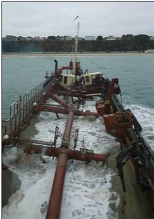Case study:Poole Bay Beach Replenishment Trial: Difference between revisions
No edit summary |
No edit summary |
||
| (One intermediate revision by the same user not shown) | |||
| Line 1: | Line 1: | ||
{{Case study status | {{Case study status | ||
|Approval status= | |Approval status=Approved | ||
}} | }} | ||
{{Location | {{Location | ||
| Line 36: | Line 36: | ||
|Specific mitigation=Flood and coastal erosion protection, | |Specific mitigation=Flood and coastal erosion protection, | ||
}} | }} | ||
{{Measures}} | {{Measures | ||
|Other technical measure=Beach nourishment, | |||
}} | |||
{{Hydromorphological quality elements header}} | {{Hydromorphological quality elements header}} | ||
{{End table}} | {{End table}} | ||
Latest revision as of 16:10, 8 November 2018
Project overview
| Status | Complete |
|---|---|
| Project web site | http://www.therrc.co.uk/sites/default/files/projects/62_poole.pdf |
| Themes | Flood risk management, Habitat and biodiversity, Monitoring, Social benefits |
| Country | England |
| Main contact forename | Leanor |
| Main contact surname | Heron |
| Main contact user ID | |
| Contact organisation | Environment Agency |
| Contact organisation web site | http://www.gov.uk/government/organisations/environment-agency |
| Partner organisations | Borough of Poole, New Forest District Council, Channel Coastal Observatory, SCOPAC |
| Parent multi-site project | |
| This is a parent project encompassing the following projects |
No |
Project summary
The trial aimed to test a new approach to beach replenishment in Poole Bay on the south coast of England. The concept was to make use of locally dredged sediment and place it in the nearshore, allowing the prevailing waves and tidal currents to move the material toward and along the beach. This approach is used in the Netherlands and more recently in Denmark. The trial is the first of its kind in the UK.
Although it was proven that there is a sediment transport connection between the nearshore and the adjacent beach (that is, nearshore deposition can replenish the beach), it remains difficult to assess the long-term fate of the material.
It is likely that both a larger quantity of material and more time are needed for sediment dispersal at this site to demonstrate the long-term viability of nearshore replenishment as an alternative to traditional methods.
Monitoring surveys and results
Lessons learnt
Image gallery
|
Catchment and subcatchment
Site
Project background
Cost for project phases
Reasons for river restoration
Measures
MonitoringHydromorphological quality elements
Biological quality elements
Physico-chemical quality elements
Any other monitoring, e.g. social, economic
Monitoring documents
Additional documents and videos
Additional links and references
Supplementary InformationEdit Supplementary Information
| ||||||||||||||||||||||||||||||||||||||||||||||||||||||||||||||||||||||||||||||||||||||||||||||||||||||||||||||||||||||||||||||||||||||||||||||||||||||||||||||||||||||||||||||||||

